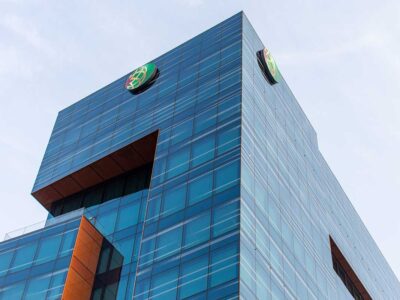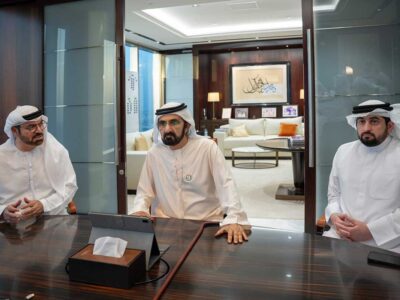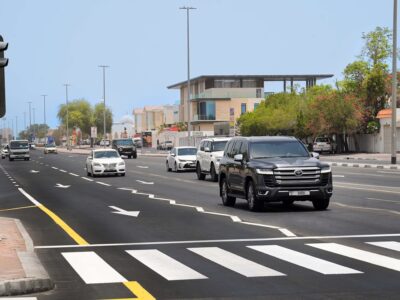For most British people, to have your work recognised by the Queen is considered one of the highest honours possible in life. On November 12, that will become a reality for Dubai expat Mark Beer.
Registrar of the Dubai International Financial Centre (DIFC) Courts and former chairman of the British Business Group, Dubai and Northern Emirates, Oxford-educated Beer was awarded the Order of the British Empire (OBE) in the 2013 Queen’s Birthday Honours list for outstanding work in strengthening relations between the UK and the UAE.
“I am enormously grateful to Her Majesty for this honour, as I am grateful for having had the opportunity to play a role in further strengthening UK trade and legal cooperation,” Beer said in June when he was announced alongside British household names such as the actor Rowan Atkinson, singer Adele, BBC broadcaster Clare Balding and novelist Jackie Collins.
Edward Hobart, Britain’s Consul General in Dubai, remarked that Beer was recognised for his part in aiding the “UAE’s extraordinary development over the last few decades.”
Established in 2004, the DIFC Courts’ original function was to offer a legal backbone to the financial free zone. Following an overhaul of Dubai’s commercial legal system in late 2011, the courts’ jurisdiction was extended to include those not connected to the DIFC, creating a truly global courtroom.
As a result, its scope and scale has grown considerably over the last nine years and, like Beer, its influence and potential has extended far beyond its home market.
“If [the dispute] has nothing to do with the DIFC but the parties have chosen that they want the DIFC Courts and chosen to come to us then they can come to us,” Beer explains.
In essence, a product could be made in Beijing by an Indian company registered in the Cayman Islands, sold through a website in the UK and shipped to the Gulf by a US distributor, but a consumer or retailer could insist the DIFC Courts be installed as the legal jurisdiction and, should anything go wrong and lawyers are needed, both parties would be facing a showdown in Dubai.
So if you are thinking of buying a property in Dubai, signing any type of contract in Doha or hiring someone in Riyadh then you can simply have the following line parachuted into the small print and any legal fallout will be held under British common law in the DIFC Courts: “Any dispute arising out of or in connection with this contract, including any question regarding its existence, validity or termination, shall be subject to the non-exclusive jurisdiction of the Courts of the Dubai International Financial Centre.
“Each party irrevocably submits to the jurisdiction of the DIFC Courts and waives any objection it may have to disputes arising out of or in connection with this contract being heard in the Courts of Dubai International Financial Centre on the grounds that it is an inconvenient forum.”
The move gives investors in the region a lot more confidence and comfort, especially those who may be nervous about the thought of going up against an opponent in an Arabic-speaking local courtroom.
“Companies operating in the English language, they are the ones picking up the phone to us. The state can only give people a choice but what [users] ultimately do is up to them. But it does mean you have a choice, just as in China you have a choice to go to the English language common law courts in Hong Kong or the municipal common law courts in China. Just as in Germany you can go to the English or German language courts. It is about giving investors a choice so they can understand the contractual language.”
As a result, companies operating in Dubai and the wider region are now increasingly inserting the above clause into their contracts, Beer says. “From the small and medium-sized enterprise [SME], all the way to the very top end of investment allocation of resources, it is the DIFC Courts that is the jurisdiction of choice.”
While this may offer some comfort to investors, it also has a wider socio-economical impact, Beer says: “Today’s watch word is risk management. It may be a million-dollar contract but, if the risks associated are negative, [companies] are not going to do it… How am I going to manage my risk and avoid a situation where I’ll have to translate documents into a different language and ensure, if I have a concern about this contract, I will know how the process will flow.”
Previously companies were reluctant to invest in emerging markets because of the level of risk, but the widened jurisdiction of the DIFC Courts offers some potential peace of mind.
“The major financial institutions and companies in the Middle East are now acting differently,” Beer says and he observes that these bodies are now increasingly opening up credit lines to areas of the Middle East that are in need or urgent funding.
“For the GCC it is not a concern as it is cash rich, but it is in less-developed parts of the Middle East to assist the people there. If organisations are not extending credit to countries where historically they didn’t know how to enforce their paperwork, then what you see is slow economic growth.”
Beer says research shows that economies that develop an efficient judiciary often see growth increase by up to 2 percent per year as a result, compared to economies that have underdeveloped judiciaries and are considered high risk.
“Two percent doesn’t sound like much but in a world that is flat, it is very nice thank you very much… We didn’t have that before as they couldn’t get comfortable with the risk, but now they have an option… We have gone from supporting the DIFC to supporting people’s desire to access these [emerging] markets.”
The success of the DIFC Courts is evident from the fact that last year its caseload showed a record 40 percent year-on-year increase. The value of cases rose more than 400 percent in the same period from $33m to just over $169m, reflecting the increasing complexity of commercial cases coming before the courts. On top of this, the number of DIFC Courts’ registered lawyers grew by almost 50 percent to 349 during the same period.
However, Beer believes the courts’ caseload will taper off next year as a result of the resurgence in the Dubai economy. “The trend is that in the depths of a recession people tend not to go after each other… [and] at the peak of an economic boom no one is falling out with each other as they don’t have the time as they are making too much money.
“As it is changing, that tends to be where to you see the peak in cases and you could say that would explain 2011 and, to some extent, 2012. Companies trust the court to deal with the cases and the other side to be able to pay.
“If you follow the trends… this year we will probably see a tailing off of cases and that will stay steady as the economy stays in the growth phase and only when, or if, that changes will we see more come in.”
Beer also reports that out-of-court settlements are becoming more common as the historical caseload in place over the last decade gives lawyers a clear precedent as to how rulings will pan out.
“Our focus is always to help the parties to settle… 95 percent of cases don’t get to trial… There is so much certainty in the system now as, with 600 or so cases behind us, lawyers can sensibly advise clients that if this goes to court these are your chances.”
The success of the DIFC Courts led to the establishment in 2009 of the Dubai World Tribunal, a special body set up to wade through the claims relating to Dubai World, the government-backed vehicle that was faced with a queue of creditors with billions of dollars in unpaid claims.
Separate from the DIFC Courts, but operating within the same building and infrastructure, the tribunal helped to reassert Dubai’s commitment to addressing its debt issues in a mature and transparent way. The majority of cases were related to Nakheel, the developer behind various man-made islands off the Dubai coastline and many of these have now worked their way through the system. While Beer believes the tribunal will not be wound up any time soon, its caseload has also begun to drop off extensively.
“We are still getting cases but not at the pace when it started. We are getting a good settlement rate and that is what we look for. In my personal opinion, it has done an incredible job. It’s restored confidence and positioned Dubai as perceived by lawyers, particularly restructuring lawyers, as the number-one location of how you handle a complex restructuring.
“We have had Americans, Italians, Greeks and Brits come and want to see it. They ask ‘how did you do this? How did you set up a law passed on September 2009, which combined the best practices from the UN model and the American model and by the 25 December you had a fully running tribunal. Why doesn’t it cost hundreds of millions of dollars a year to run and why isn’t it inefficient? How has Dubai managed to do that?’ It is has gone beyond repositioning confidence but repositioning the perception of Dubai as investor friendly.”
While November will see Beer feted by the highest in the British establishment in London, December will see the DIFC Courts given a global stage when it hosts the Middle East’s first International Conference on Court Management. Organised by the International Association for Court Administration (IACA), the event will take place at the Grand Hyatt Hotel on December 9 and 10 and will see the launch of a first Framework for Court Excellence developed specifically for the Middle East.
Last year, an international survey developed by the IACA found the DIFC Courts scored 100 percent on affordability, accessibility, resources and planning. With a score of 900 points out of one thousand, based on other criteria such as public trust and confidence, client needs and satisfaction, court resources and court leadership, it’s safe to say Beer is happy with the results.
“Our focus is on customer service and those that use the court and make sure they are happy and we live up to our role in terms of responsiveness and helpfulness… Are we perfect? No system is perfect and as soon as we think we’re perfect we need to be sorted out,” Beer says with a smile. With high approval ratings, a 95 percent settlement record and an OBE on the way, we are confident Beer won’t “need to be sorted out” any time soon.








